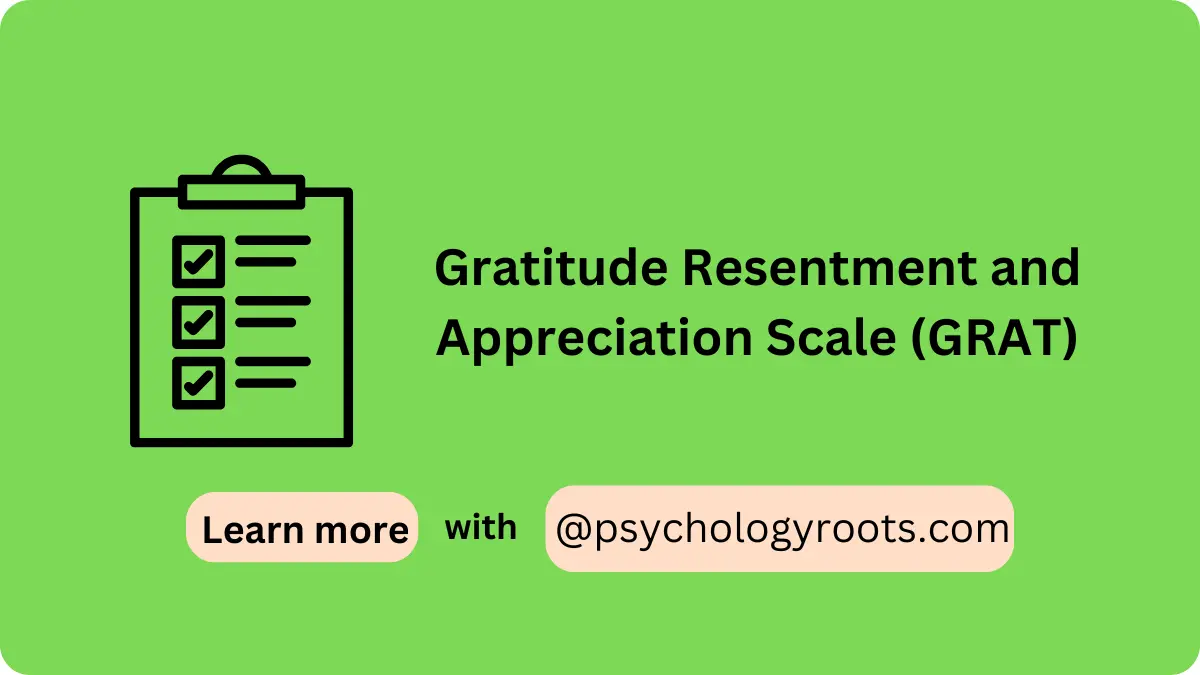Table of Contents
Gratitude Resentment and Appreciation Scale (GRAT)
Here in this post, we are sharing the “Gratitude Resentment and Appreciation Scale (GRAT)”. You can read psychometric and Author information. We have thousands of Scales and questionnaires in our collection (See Scales and Questionnaires). You can demand us any scale and questionnaires related to psychology through our community, and we will provide you with a short time. Keep visiting Psychology Roots.
About Gratitude Resentment and Appreciation Scale (GRAT)
Scale Name
Gratitude Resentment and Appreciation Scale (GRAT)
Author Details
Watkins, P. C., Woodward, K., Stone, T., and Kolts, R. L.
Translation Availability
English

Background/Description
The Gratitude Resentment and Appreciation Scale (GRAT) – Short Form is a widely recognized psychological assessment tool designed to measure individual differences in gratitude. Developed by Watkins and colleagues in 2003, this instrument is a shorter version of the original GRAT scale, maintaining its validity while reducing the burden of time on respondents.
The GRAT evaluates three key dimensions of gratitude:
- Sense of Abundance – Measuring an individual’s recognition of life’s positive aspects.
- Appreciation for Others – Gauging the acknowledgment of others’ contributions to one’s life.
- Simple Appreciation – Assessing an individual’s ability to find joy and thankfulness in everyday experiences.
This tool has been extensively used in research to explore the relationship between gratitude and subjective well-being, demonstrating its crucial role in promoting positive emotions, interpersonal relationships, and mental health. The short form of the GRAT is particularly useful for large-scale studies or settings where time constraints exist.
Administration, Scoring and Interpretation
- Obtain a copy of the GRAT – Short Form from the original publication or an authorized source.
- Explain the purpose of the assessment to the respondent, highlighting its focus on measuring gratitude and appreciation.
- Provide clear instructions for completing the self-report questionnaire, ensuring participants understand the Likert scale rating system used in the tool.
- Inform participants that the test typically takes 5–10 minutes to complete.
- Administer the questionnaire in a quiet, non-distracting environment to ensure accurate responses.
Reliability and Validity
The GRAT – Short Form exhibits strong psychometric properties. It has shown high internal consistency, with Cronbach’s alpha coefficients often exceeding 0.80 across various studies. Test-retest reliability is also robust, indicating the scale’s stability over time.
In terms of validity, the GRAT has demonstrated excellent convergent validity, correlating strongly with other measures of gratitude, such as the GQ-6 Gratitude Questionnaire. Furthermore, studies have highlighted the scale’s predictive validity, linking higher GRAT scores to increased subjective well-being, life satisfaction, and lower levels of depression and resentment.
Available Versions
16-Items
Reference
Watkins, P. C., Woodward, K., Stone, T., & Kolts, R. L. (2003). Gratitude and happiness: Development of a measure of gratitude, and relationships with subjective well-being. Social Behavior and Personality: an international journal, 31(5), 431-451.
Important Link
Scale File:
Frequently Asked Questions
What is the GRAT – Short Form?
The GRAT – Short Form is a self-report measure designed to assess individual differences in gratitude across three key dimensions.
How long does it take to complete the GRAT – Short Form?
It typically takes 5–10 minutes to complete.
Who can administer the GRAT – Short Form?
It can be administered by researchers, psychologists, or other trained professionals in both clinical and research settings.
Is the GRAT – Short Form reliable?
Yes, it has demonstrated high internal consistency and test-retest reliability in various studies.
What are the main dimensions of gratitude measured by the GRAT?
The GRAT assesses a sense of abundance, appreciation for others, and simple appreciation.
Disclaimer
Please note that Psychology Roots does not have the right to grant permission for the use of any psychological scales or assessments listed on its website. To use any scale or assessment, you must obtain permission directly from the author or translator of the tool. Psychology Roots provides information about various tools and their administration procedures, but it is your responsibility to obtain proper permissions before using any scale or assessment. If you need further information about an author’s contact details, please submit a query to the Psychology Roots team.
Help Us Improve This Article
Have you discovered an inaccuracy? We put out great effort to give accurate and scientifically trustworthy information to our readers. Please notify us if you discover any typographical or grammatical errors.
Make a comment. We acknowledge and appreciate your efforts.
Share With Us
If you have any scale or any material related to psychology kindly share it with us at psychologyroots@gmail.com. We help others on behalf of you.